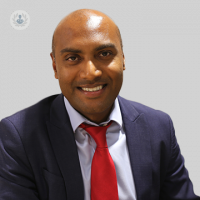Choosing your surgeon for breast surgery
Written in association with:Oncoplastic breast surgery both removes cancerous breast tissue, as well as preserving the look and symmetry of the remaining breast. Mr Seni Mylvaganam is an expert oncoplastic breast surgeon and cosmetic breast surgeon who explains how these surgeries are performed, and gives advice an choosing your surgeon for these procedures.

What is oncoplastic breast surgery?
Oncoplastic breast surgery is breast cancer surgery that ensures there is minimal effect on the cosmetic appearance of the operated breast. It is the ability to undertake cancer surgery but ensure that breast shape and symmetry are not compromised. This is often done when part of the breast needs to be removed to treat a cancer, so reshaping is done at the same time to prevent deformities.
What is breast reconstruction?
Breast reconstructive surgery is usually done after a mastectomy (removal of all breast tissue). The goals of breast reconstruction are to replace volume and also to achieve symmetry to the remaining natural breast. There are many techniques that can be used, for example, volume can be replaced either with an implant or using your own tissue from another part of the body.
How do I decide what type of reconstruction to have?
This is a very personal choice. The first step is receiving clear information about the benefits, risks and expectations of the outcome for each strategy by a trained surgeon. The options available differ in complexity of surgery and recovery and also potential long-term effects. Understanding each patient, including requirements for cancer care, risk factors and patient expectations can help the surgeon tailor the choices toward individual needs.
How do I choose my surgeon for breast reconstructive surgery?
Firstly ensure your surgeon is trained in the range of techniques for breast reconstruction and conducts that meet national standards. The first step to check this is to ensure they are members of the Association of Breast Surgery which is the UK association representing the specialty. If they have an NHS Consultant post then they will be required to audit and review their results ensuring compliance with national standards. Then after this, and as important, is the rapport you develop with the surgeon.
Reconstructive surgery requires a complex set of decisions with many options available. You should choose a surgeon who you feel could best help guide you through this process.
How do I choose my cosmetic breast surgeon?
Firstly ensure your surgeon is a member of an appropriate national organisation, such as the Association of Breast Surgery or the British Association of Plastic and Reconstructive Surgery which are the UK associations representing the specialty. Secondly, cosmetic breast surgery is undertaken for many reasons and choosing a surgeon who you develop a good rapport with is essential. Your surgeon should listen and understand why you have chosen cosmetic surgery and your expectations from that surgery. They should then be able to guide you through the planning of the surgery and selecting the right technique and if implants are needed to best achieve those expectations. Your surgeon must also be very honest and ensure that what you expect is realistic and achievable without increasing the risk of complications or long term problems.
What are the problems or risks of breast implants
Breast implants can be used to reconstruct breasts after cancer surgery or to enlarge and uplift breasts for cosmetic purposes. There are four key risks associated with breast implants which your breast surgeon should discuss with you.
The first is the risk of removal of the implant due to a complication within the first three months. This conversation will differ depending on whether they are used for reconstruction or enlargement.
Secondly, the risk of implant rupture, which is quite different now to previous generations of implants. Current implants may now last a lifetime and are only replaced if a problem develops.
Thirdly, capsular contracture, which is the body’s immune response to an implant. A capsule, which can be likened to a layer of cling film, will develop around all implants and is not harmful. However, in a small number of people that capsule can thicken and harden, causing pain and misshaping of the implant, requiring further surgery.
Lastly, there is the 1 in 300,000 risk of anaplastic large cell lymphoma. This is a type of cancer which develops in the capsule around implants. It is very rare and requires further surgery if it is diagnosed.
If you would like to find out more about breast surgery (reconstruction and cosmetic), make an appointment with a specialist.



